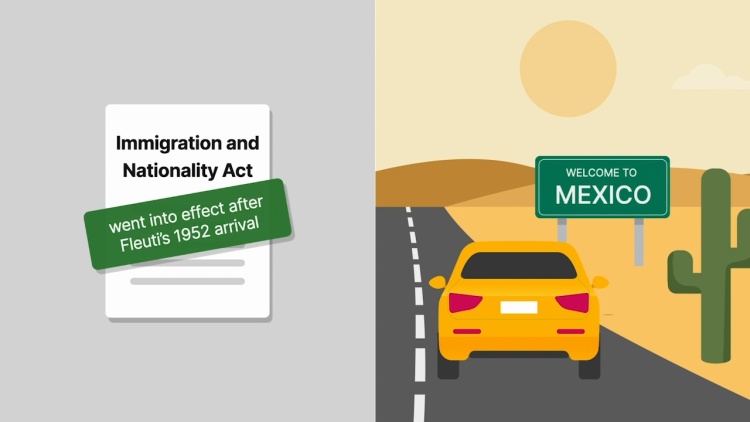Rosenberg v. Fleuti
United States Supreme Court
374 U.S. 449 (1963)
- Written by Darya Bril, JD
Facts
Fleuti (defendant) was a Swiss national and lawful permanent resident who was first admitted to the United States on October 9, 1952, and continuously stayed in the United States, except for one trip to Mexico for a few hours in August 1956. Rosenberg (plaintiff), a director of the Immigration and Naturalization Service (INS), sought to deport Fleuti pursuant to § 241(a)(1) of the Immigration and Nationality Act (the Act). Specifically, the INS wanted to deport Fleuti under § 212(a)(4), which deemed excludable an alien “afflicted with a psychopathic personality.” The INS’ argument was that Fleuti had been excludable under that statutory provision upon his return in 1956, because he was a homosexual. Deportation was ordered, and Fleuti’s appeal to the Board of Immigration Appeals was dismissed. Fleuti then brought an action for declaratory judgment and review of the administrative action. Fleuti argued that § 212(a)(4) was unconstitutional as being vague and ambiguous. The trial court granted summary judgment for the INS. On appeal, the Court of Appeals for the Ninth Circuit held that as applied to Fleuti, Section 212(a)(4) was unconstitutionally vague. The INS petitioned the Supreme Court for certiorari to review this question. However, the Court determined that a threshold issue of statutory interpretation existed in this case, which obviated the decision as to whether § 212(a)(4) was constitutional. The issue was whether Fleuti’s return from Mexico in 1956 constituted an “entry,” such that he would have been excludable at that time. Notably, the Immigration and Nationality Act of 1952 became effective on December 24, 1952, after Fleuti had entered the country. Therefore, he could not have been excludable at the time of his original entry in 1952, since the Act had not taken effect.
Rule of Law
Issue
Holding and Reasoning (Goldberg, J.)
Dissent (Clark, J.)
What to do next…
Here's why 907,000 law students have relied on our case briefs:
- Written by law professors and practitioners, not other law students. 47,100 briefs, keyed to 996 casebooks. Top-notch customer support.
- The right amount of information, includes the facts, issues, rule of law, holding and reasoning, and any concurrences and dissents.
- Access in your classes, works on your mobile and tablet. Massive library of related video lessons and high quality multiple-choice questions.
- Easy to use, uniform format for every case brief. Written in plain English, not in legalese. Our briefs summarize and simplify; they don’t just repeat the court’s language.





